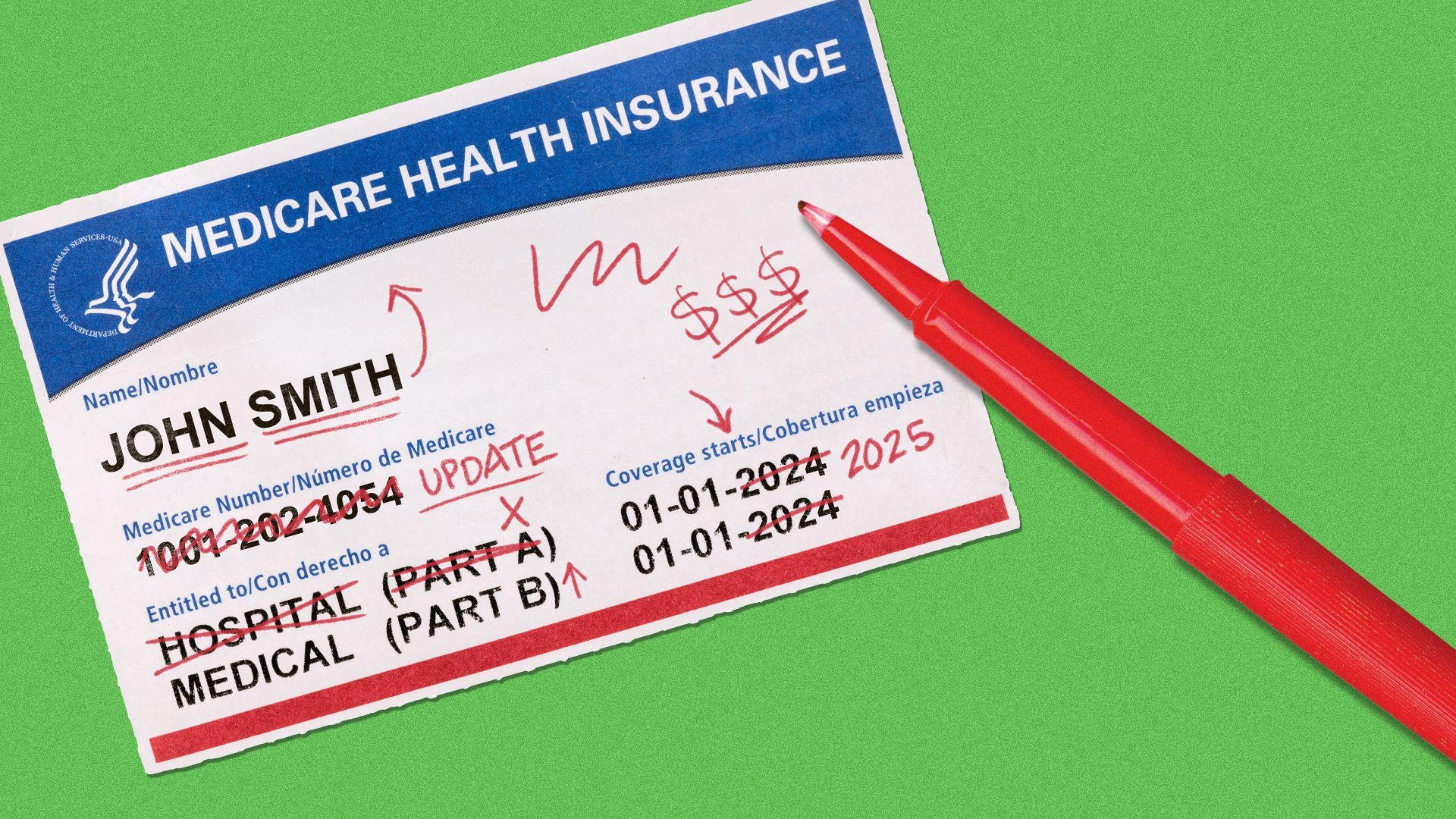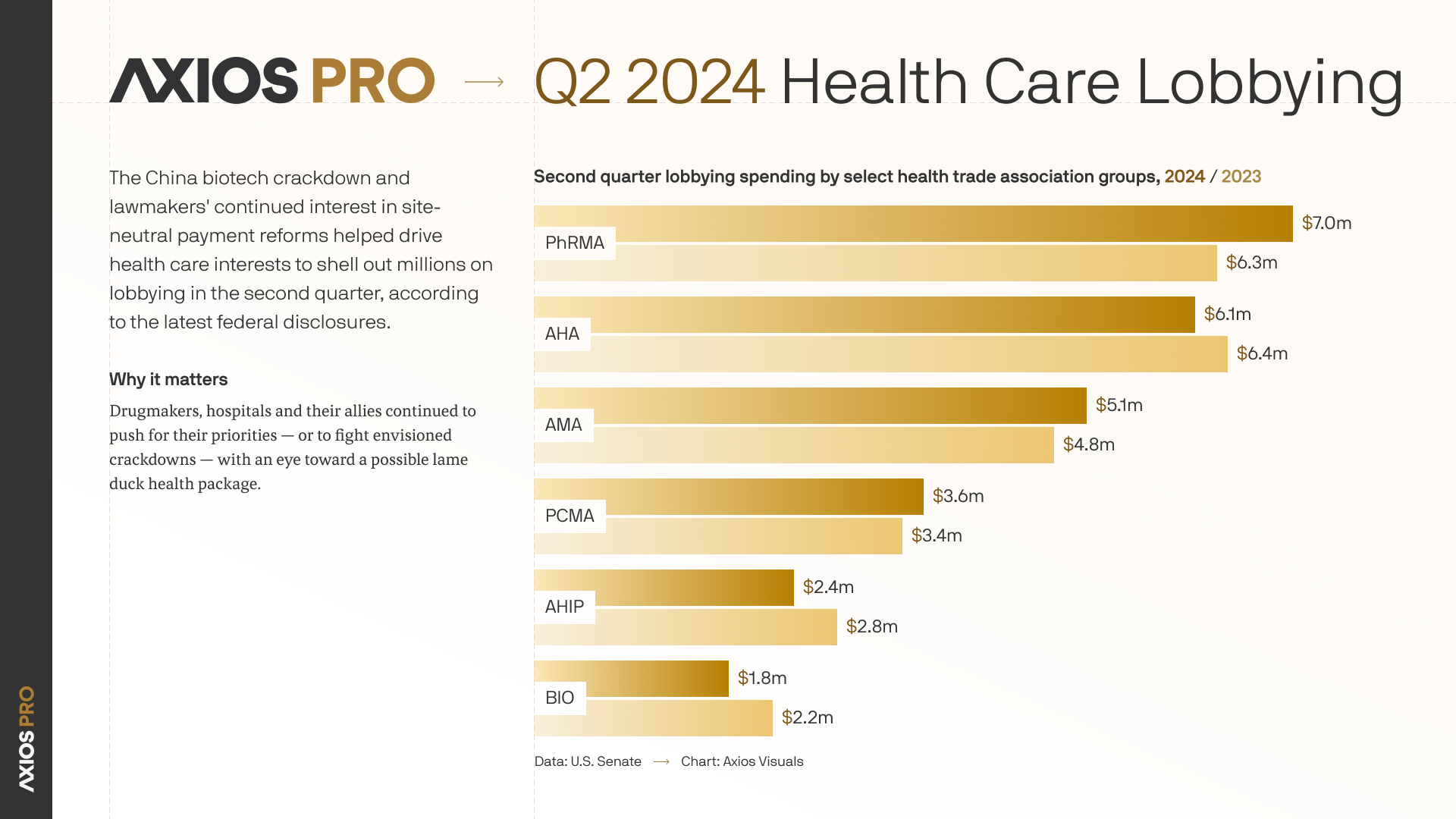| |
| |
| |
| |
| |
| Axios Vitals |
| By Maya Goldman and Tina Reed · Oct 03, 2024 |
| 👚 Happy Thursday and Happy "Mean Girls" Day to those who celebrate. Today's newsletter is 961 words or a 3.5-minute read. Situational awareness: The CDC on Wednesday warned that illegal online pharmacies are selling millions of counterfeit prescription pills that frequently contain fentanyl at deeply discounted prices, often without requiring a prescription. It said individuals should only take drugs prescribed by a provider and dispensed by a licensed pharmacy. |
| |
| |
| 1 big thing: Medicare Advantage's coming squeeze |
| By Maya Goldman |
| |
 |
|
| Illustration: Lindsey Bailey/Axios |
| |
| Major insurers including Aetna and Humana are scaling back their Medicare Advantage plans for next year, leaving some seniors around the country hunting for new care arrangements just weeks before the 2025 sign-up period begins. Why it matters: Private Medicare plans will cover more than half of Medicare beneficiaries — or more than 35 million people — next year, and even small disruptions to coverage could be difficult for seniors living on fixed incomes to manage. The big picture: Medicare Advantage has been a lucrative and fast-growing business over the past couple of years, but the tide may be shifting after the Biden administration made a series of changes to reimbursements and other policies that didn't land well with insurers. - Medicare advisers to Congress and other experts say the insurers are overpaid and that the program costs taxpayers billions more than it should.
State of play: Insurers on average decreased their offerings of Medicare Advantage plans that include prescription drug coverage by 6.6% for 2025, according to a Leerink Partners analysis of CMS data. - Aetna is selling 10% fewer of those plans next year, compared with 2024. UnitedHealth Group is offering 5.4% fewer, and Humana 2.5% fewer.
- The open enrollment period to sign up for plans begins on Oct. 15.
Catch up quick: Medicare administrators last spring announced that MA plans would see a 0.16% cut to their base pay next year. - Though payments can be adjusted upward to reflect the health of customers, Humana, Centene and Blue Cross and Blue Shield of Kansas City have said they'll exit some MA markets, citing financial and regulatory pressures.
- Cigna earlier this year announced plans to sell off its Medicare Advantage business, though it's still offering plans in 600 counties next year.
Read more |
    |
| |
| |
| 2. Medicare drug coverage gets facelift for 2025 |
| By Maya Goldman |
| |
 |
|
| Illustration: Annelise Capossela/Axios |
| |
| Changes are coming to Medicare prescription drug coverage next year that are expected to lower many seniors' out-of-pocket costs. Why it matters: The Inflation Reduction Act included an overhaul of Medicare's prescription drug benefit, and some key reforms kick in next year, including: Capped out-of-pocket costs. Medicare beneficiaries won't pay more than $2,000 for prescription drugs in 2025, no matter which plan they choose. End of the "doughnut hole." Plans will no longer have a coverage gap where insurers significantly scale back how much they'll pay for prescriptions after enrollees rack up a certain dollar amount, only to reactivate when another cost milestone is reached. Premium changes. Seniors will, on average, see lower premiums for their prescription drug coverage. Stand-alone Part D plans will have an average monthly cost of $40, while Medicare Advantage plans that include prescription insurance will have an average drug premium of $13.50. Share this |
    |
| |
| |
| 3. Thousands of excess deaths tied to hurricanes |
| By Andrew Freedman |
| |
 |
|
| Sam Souhail puffs on a cigar while pushing mud out of his shop in Asheville, N.C. Photo: Melissa Sue Gerrits/Getty Images |
| |
| Hurricanes and tropical storms have long-term health consequences, generating 7,000 to 11,000 excess deaths over the 15 years following the event, a new study finds. Why it matters: Until recently, most of the attention has been focused on direct causes of death, such as drownings from floodwaters, rather than the complex cascade of events that can elevate mortality long after a storm fizzles. Zoom in: The new findings in Nature show much higher excess deaths from the social and economic upheaval left in the wake of tropical cyclones than expected, coauthor Solomon Hsiang of Stanford University told Axios. - In fact, tropical cyclones account for roughly 3.2% to 5.1% of all annual excess deaths in the Lower 48 states, or about 55,280 to 88,080 excess deaths.
The intrigue: Indirect deaths from stress that worsens cancer, heart disease and other chronic conditions are often missing in assessments of the health burden of these storms. - Costly home repairs also can force people to dip into their savings, thus reducing their ability to spend on health care.
- And public budgets can diminish as tax revenue declines after a storm, reducing health care resources.
The study shows "no evidence" that storms several decades ago caused more or less of an impact on mortality than storms do today, which casts doubt on the effectiveness of better preparedness or improved building codes. Go deeper |
    |
| |
| |
| A message from Axios |
| Lobbying Trends to Watch Right Now |
| |
 |
| |
| Download eight data-rich slides from the Axios Pro newsroom on the state of lobbying in health care, energy and tech in Q2 2024. Download for free. |
| |
| |
| 4. Trump says he'd veto a national abortion ban |
| By Erin Doherty and Sareen Habeshian |
| |
 |
|
| Former President Trump during a campaign rally on Sept. 25 in Mint Hill, N.C. Photo: Brandon Bell/Getty Images |
| |
| During Tuesday's vice presidential debate, former President Trump announced on Truth Social that he would veto a national abortion ban — an issue on which he'd been waffling for months. Why it matters: Trump's post came less than 35 days until the election, and as polling indicates that Vice President Harris has a clear edge among women voters and on abortion rights. - Abortion has been a weak spot for Republicans in the post-Roe era — and Democrats repeatedly have hit Trump over his bragging about appointing three Supreme Court justices who struck down abortion rights under Roe v. Wade, and over the fractured reproductive health the decision created.
- The Harris campaign often points out that Trump, as part of his efforts to curry favor with hardline conservatives who want a national abortion ban, has signaled his openness to such a ban.
Driving the news: "EVERYONE KNOWS I WOULD NOT SUPPORT A FEDERAL ABORTION BAN, UNDER ANY CIRCUMSTANCES, AND WOULD, IN FACT, VETO IT," Trump wrote on his Truth Social. - Trump has said that abortion regulations should be left to the states. Democrats say that's creating a hodgepodge of laws that can give women in some states significantly more rights than women have in others.
More here |
    |
| |
| |
| 5. Catch up quick |
| |
| ⚠️ The rate of postpartum sterilization is significantly higher in Americans with sickle cell disease than in those without, a data analysis shows. (Stat) ⚖️ A doctor charged in connection with Matthew Perry's death pleaded guilty to drug charges as part of a deal to help build a case against others prosecutors think bear more responsibility for the actor's fatal overdose. (AP) 🏥 California's attorney general sued a Catholic hospital for allegedly refusing to provide a woman with emergency abortion care after she had a miscarriage. (CNN) |
    |
| |
| |
| A message from Axios |
| Lobbying Trends to Watch Right Now |
| |
 |
| |
| Download eight data-rich slides from the Axios Pro newsroom on the state of lobbying in health care, energy and tech in Q2 2024. Download for free. |
| |
| Thanks for reading Axios Vitals, and to senior health care editor Adriel Bettelheim, managing editor Alison Snyder and copy editor Matt Piper. Please ask your friends and colleagues to sign up. |
 | | Dive deeper into the future of health care | | |

0 comentários:
Postar um comentário